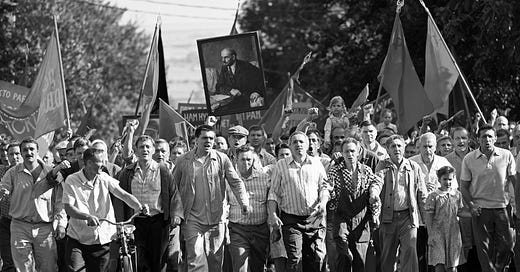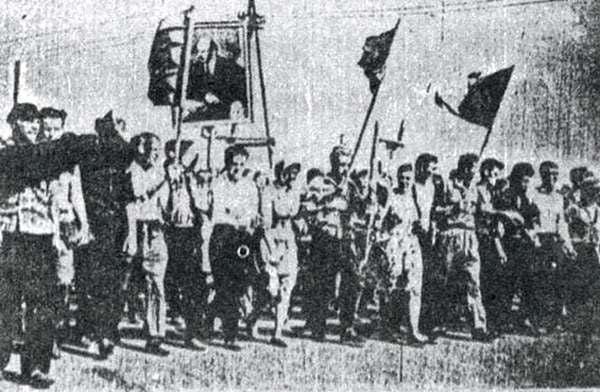Crisis Update - U.S. Initiates State Control Of Food Supply
Coincides with 60th anniversary of Soviet massacre over meat shortages
Biden White House intervenes in food market; baby food is a slippery slope.
Other shortages are inevitable amid sanctions and restrictions on food production.
Iran implements digital IDs to access rationed bread and other staples.
Sri Lankan citizens turn on politicians after their peaceful protests were ignored.
June sees 60th anniversary of Soviet massacre that exposed failure of central planning.
See also:
From Argentina To A Street Near You - A crisis born of elite conceit is about to be exported around the world (Aug 16, 2022)
(1,700 words or eight minutes of your company).
May 20, 2022
The Biden admin-regime is using war powers to seize control of the food supply.
On Thursday it invoked powers last used during the Korean war to allocate food resources, initially for the production of baby formula.
Under the Defense Production Act, bureaucrats will tell the makers of ingredients for baby formula whom they must supply. Effectively this means the government in the form of FEMA decides which companies get raw materials, while denying others. This simply shifts the disruption from one product or sector, to another.
Federal planes will scour the globe for supplies, potentially exporting the shortage to other countries.
The politically-damaging shortage of baby formula results from contamination at Abbott Laboratories, which led to the death of two babies and the recall of product.
The Financial Times says the temporary shut down at Abbott highlights the concentration (cartels or monopoly) that affects the U.S. economy, as no other producer was big enough to step up and fill the gap. [1]
Ironically, this is exactly the problem with centralized economies — the direction that Biden is going with the government regulation of food supply.
In an attempt to help mothers on welfare, under the Special Supplemental Nutrition Program, each state in the U.S. has a contract with a single manufacturer, Abbott.
The White House issued a statement: “Directing firms to prioritise and allocate the production of key infant formula inputs will help increase production and speed up supply chains.”
You don't have to be a libertarian or a strict opponent of government intervention to see where this will lead. You only have to look at the experience of previous inflation crises in the past, such as Argentina (see below) or what's happening right now around the world.
Earlier this week the governor of the Bank of England said food prices are rising at their fastest in 30 years and called the coming shock “apocalyptic.”
Iran is the first country to roll out digital IDs for food rationing. Look closer and you will note that the government of Ebrahim Raisi just increased food prices, so the supposed “cure” of goverment regulation is already in place. It failed, so digital rationing is next.
We wouldn’t usually quote the Atlantic Council (the business end of NATO) but on this occasion the impact, or futility, of government intervention leaps off the page — even of its opponents. [2]
The Ayatollahs have always been close to the Swiss, French and Germans so it's not surprising they're cooperating with the World Economic Forum’s plan to merge our physical, digital and biological identities.
Sri Lankans took to violence after a peaceful protest failed. The protests are about food shortages but also against police brutality and the neglect of politicians to respond.
Elites around the world will have noticed Ceylonese crowds tipping expensive vehicles into the river and beating police chiefs.
They will already have instructed politicians to put measures in place. The problem is that the food shortages cannot be averted now. Crops are not being planted. The shortage is inevitable.
Venezuela illustrates what could happen even in richer countries. After negotiations with Russia the country has only two-thirds of its usual fertilizer requirement.
Shortage of fertilizer isn't the only threat to the food supply. Economic disruption means that farmers will plant only one-third the usual volume of crops, Ramon Bolotin, president of the PAI independent agricultural producers told AFP. [3]
Fuel shortages will also push food prices higher, both on the farm and on the way to the grocery.
Circling centralization
If governments respond with price controls, that will push demand higher than producers can meet. They will either reduce production or divert it into the black market where they can command higher prices (look at the behaviour of cigarette manufacturers in the West).
If governments take control of distribution — of raw materials or finished goods — they will enter a vicious circle of centralization: state shops and perhaps federally-employed drivers, with the state setting wages in order to control costs.
Controlling prices and distribution cannot increase supply. It can only ensure that goods go to favoured cohorts. After the disaster of centralized agriculture, millions dead in famines and a forced return to a partial market economy, the Soviet Union by the mid-1930s resorted to special shops for politicians and the security apparatus.
The Biden regime has already gone partway down this path, using government planes as part of Operation Fly Formula, presumably to take formula from the mouths of babes elsewhere in the world.
If governments acknowledge that controlling distribution cannot increase supply, they may take control of production. This could be explicit, through expropriation and nationalization, or implicit by subsidies that make government the first customer.
If you think the Soviet famines of the 1920s and 30s were teething troubles, the Novocherkassk massacre of 1962 tells otherwise. Locomotive workers went on strike after meat and dairy prices were increased. Workers who were given increased production quotas could not afford to buy the meat they packed with their own hands.
This is the reality many U.S. workers will face if shortages deepen and inflation accelerates. Those Russian workers faced down troops — fully believing a government that said that it cared for socialist principles and for all. The troops were ordered to open fire (the Politburo knew the protest had exposed a crucial vulnerability). They killed at least 26, wounding up to 100. Survivors were sentenced to up to 15 years. That was just sixty years ago. [4]
The 60th anniversary is Jun 2, 2022. A movie about the tragedy, Dear Comrades! (2020) by the acclaimed Russian director Andrey Konchalovsky, is more resonant than he could have imagined. It is linked here. [5]
As an aside, the West complains that Russia is hoarding grain and not allowing it to exit Ukraine. When it was communist, the Soviet Union often had to import grain, which the U.S. used as leverage, for example to help Jewish émigrés. See this CSM article from 1980 on why the Soviet Union could not feed itself. [6]
Now it is the West, Silicon Valley, the Defense Department and the World Economic Forum that has a love affair with central planning. If they get their one world government, or their new world order, in the form of the World Health Organization’s Pandemic Treaty — giving a politburo of technocrats power of lockdown and death over the globe — who will rescue those in the future who find themselves in the position of Soviet Jewry?
Yuri Bezmenov, the KGB operative who defected to Canada in the 1980s often made this point: “unlike me, you will have nowhere to defect to.”
See Moneycircus, Jan 2022 — The Great Reset As Subversion: A KGB defector warned us about crisis tactics decades ago
Argentine trajectory
In a classic hyperinflation crisis what happens first is the people protest food shortages. They react emotionally and blame others for their hardship. Politicians jump on the bandwagon, witch-finding speculators and reaching for the lexicon of wreckers, saboteurs and bourgeois criminals.
Just as with witches on the ducking stool, only the innocent drown. Those who survive will either make a pact with criminal elements in the bureaucracy, or they will be ritually burned at the stake.
Central government influence in food supply is nothing new. The U.S. makes massive use of farm subsidies yet these get ever more complex, especially when linked to ecological or climate regulations. Only the largest farms can fully take advantage of subsidies — ironically this reduces food security, the reason for subsidies in the first place. Three-quarters of subsidies go to one-tenth of farmers. [7]
In Oct 2020 the Department of Homeland Security launched ‘Enhanced Visibility of Food Supply Chains’ — whereby the Feds increased their knowledge of who has what.
The U.S. government is reportedly storing millions of dollars a month of storable food in underground bunkers — hard to verify because producers would have to sign non-disclosure agreements.
This disrupts the food market, but also shows that governments have no idea how food production works: they are only capable at looking at production through they lens of regulation. Think of a regulator on a fuel pipe — it can reduce the flow, but it cannot produce more than was there in the first place.
Argentina, like Brazil, has long been the country of the future — jokers say the future never comes. The reason for failure is not lack of arable resources. It can only be government.
The former has coped for decades with hyperinflation, debt and interference that reduces the transparency of prices. As a shopper you don’t need to know why something costs what it does. All that matters is whether you can afford it.
The producer needs to know all the elements that make up that price. When governments set prices by fiat, or muddy the waters with subsidies, regulations, compliance costs and secrecy, all transparency is lost.
It is not crisis but government itself, that reduces productivity. To quote Bruce A. Babcock, Professor in the School of Public Policy at the University of California, Riverside:
“Argentina provides a near-perfect example of a major agricultural competitor that actually reduces the competitiveness of its farmers through both official and unofficial policy interventions... The impact on agriculture is lower investment, productivity, production, exports, and farmer income.”
You are talking about South America’s biggest country after Brazil, with twice as much arable land per person as the United States. To cripple such an economy must take a tremendous effort by bureaucrats.
[1] FT, May 19 — Joe Biden invokes Korean war-era powers to tackle baby formula shortage
[2] Atlantic Council, May 12 — The Ebrahim Raisi government just jacked up food prices. Iranians are understandably angry
[3] AFP, May 20, 2022 — Russia's invasion of Ukraine sets off Latin American fertilizer race
[4] Libcom Org — 1962: The Novocherkassk tragedy
[5] Andrey Konchalovsky, 2020 — Dear Comrades!
[6] CSM, 1980 — Why The Soviet Breadbasket Is Never Full
[7] Kimberley Amadeo, Apr 2022 — How Farm Subsidies Affect the U.S. Economy





There is no definite link of bacteria from two babies who died and the formula from Abott Labs. See https://news.yahoo.com/explainer-happened-abbott-baby-formula-194225555.html . (Check and you can probably find stronger reference. )
"Abbott says https://www.abbott.com/corpnewsroom/nutrition-health-and-wellness/abbott-update-on-powder-formula-recall.html there is no evidence to link its formulas to these illnesses. The FDA and the CDC have not disclosed any information that connects the illnesses and the plant. FDA officials said that the investigation was impeded by having only two of the four sickened babies' clinical samples.
"The CDC analyzed clinical samples from two of the infants and did not find a genetic match to the environmental strains found at the plant. It also said the bacteria from the patient samples were not closely related to one another."